How to teach (moral, ethics, principles) values (to students, children and adults) (in the classroom, home, outside, office) | Fun ways to teach values to preschoolers, students, children, adults) | Why values is needed in every child and adult
Hello friends, how are you doing today? Welcome to #Relationships-Parenting website / blog.
Let you and your well-wishers live a happy and prosperous life through out your life term.
In this website / blog, you will always learn about #Relationships #Parenting.
Also subscribe / follow to our various social media networks from here to learn more about #Relationships #Parenting:
Just before going to “How to teach (moral, ethics, principles) values (to students, children and adults) (in the classroom, home, outside, office) | Fun ways to teach values to preschoolers, students, children, adults) | Why values is needed in every child and adult“, let us know a brief, basic and very important information.
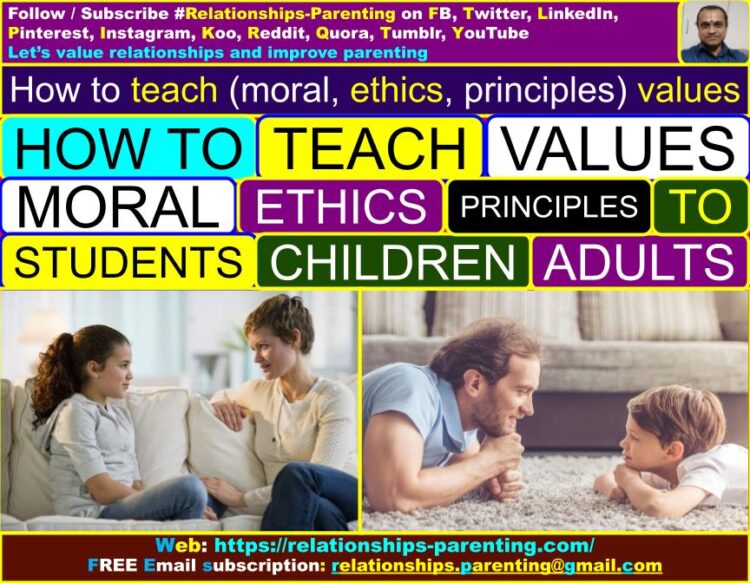
Moral (Ethics) meaning or definition : Moral or ethics or principles is the difference between what is right and what is wrong. It has direct relationship with or something which relates to principles or rules of proper conduct and actions.
Moral means something ethical. It is a way of expressing or conveying truths or advice on right behavior as a speaker or a literary work.
Morality or ethics does not mean “what I think is right” or “what I am doing right is moral”. Morality or ethics means distinguishing right from wrong.
You may think that what you are doing is right, but in reality, it may not be right or ethical in nature. But rather it means, doing something according to the right rules is moral or ethical.
Sometimes these rules are made by God and sometimes it is made by the government, also some of them are made by the principal or head of the educational institution or company and sometimes by the head of the family.
All these people know and distinguish what is right and what is wrong. In this post (article) you will find different ways of learning values or ethics or morals or principles according to ancient ways and modern ways.
All these points are not based on personal idea of right or wrong. But it is according to a code of conduct made by God or the government, or more principled or ethical or moral people.

Some of the common questions asked or frequently asked questions (FAQs) about this subject is as given below:
How to teach values to students, children, adults | What are values for kids and adults | Fun ways to teach values to preschoolers, students, children, adults |
Most important things to teach a child or adult | How to teach values to my children or family members | Teaching values in early childhood education | Why values is needed in every child or adult
List of about “How to teach (moral, ethics, principles) values (to students, children and adults) (in the classroom, home, outside, office) | Fun ways to teach values to preschoolers, students, children, adults) | Why values is needed in every child and adult” is as given below:
Nothing good in life comes easily : Let you know that nothing good comes easy. Be it education or money or fame or whatever it is, nothing good in life comes easily.
All great people have worked very hard and worked a lot in their life to earn education and money and fame etc. Hard work, concentration, perseverance and focus are the only ways to reach your ultimate goal.
In most cases, results do not come easily or happen overnight. It is true that nothing great ever comes so easily. Often times, it takes a lot of hard work, patience and of course lots and lots of dedication and persistent perseverance.
You can take examples of great people around the world, all have worked very hard to gain what they are today. Hard work and continuous dedication is the foundation of success.
You can live without regret knowing that you did your best to achieve what you wanted to achieve. Aligning your efforts with your aspirations will give your life a sense of meaning and help you sleep better at night.
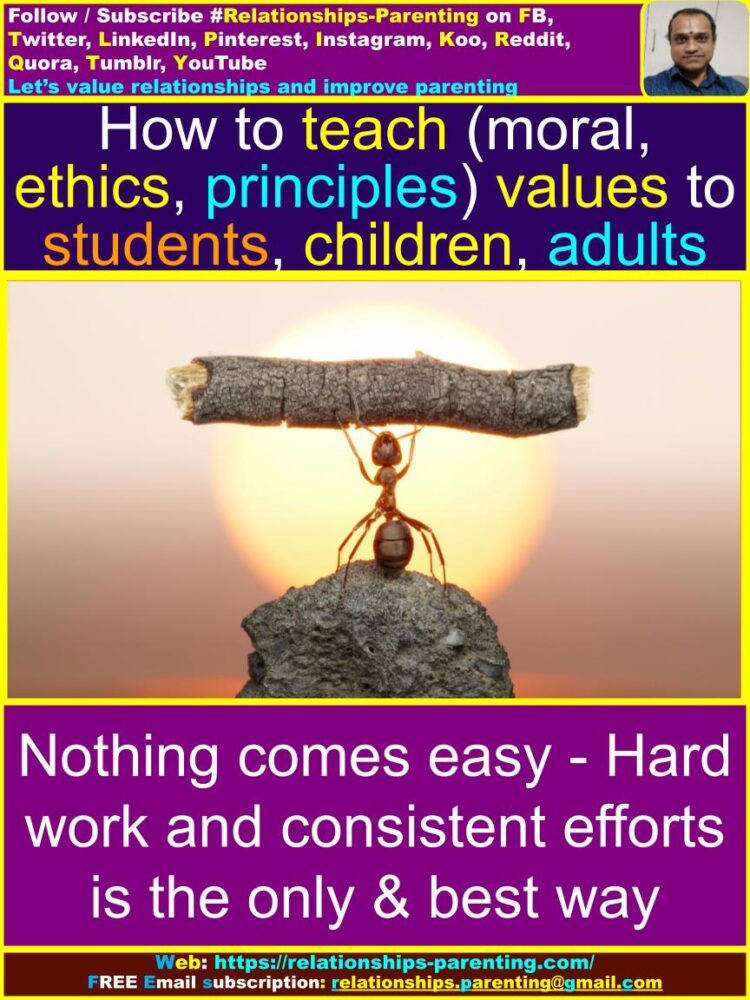
Honesty is the key to success : Sometimes, even after you work hard, you don’t taste the success after many attempts. But that doesn’t mean you have to be dishonest with yourself and to the nature.
No, you should never give up, but rather you should give your best again and again with sincerity until you succeed. If you want to be successful, you must be honest with yourself and nature. (Here nature means everything and everyone.)
Honesty is the only way to know what you are doing wrong and how to improve. Being honest with yourself allows you to understand your own constraints, limitations and work on them.
Honesty allows you to set realistic goals necessary to achieve success. Honesty is about showing respect towards others and having integrity and self-awareness.
Honesty promotes openness, empowers us, and enables us to develop consistency in how we present facts. Honesty is trust and an important foundation in social relationships.
Honesty gives us hope, confidence, empathy and improves decision making. Honesty sharpens our perception and allows us to see everything around us with clarity.

Integrity is the backbone of character : Ethics, principles, virtues, liberty are the backbone to stand against wrongs and power to choose right things etc. add up and form integrity.
The values we accumulate over the years build our personality step by step and brick by brick with much hard work and constant effort. Based on good character, we enhance our ability to act quickly with integrity and courage.
It takes a lot of fortitude to make the right choices at the right time that may not be popular with the general public or may not make sense to others but it preserves your integrity. It takes wisdom to stand strong against peer pressure.
No matter where you are in your journey of demonstrating personal integrity, you will never improve if you do not have moral values. Begin by reflecting on areas in your personal life or workplace where you can demonstrate integrity.
Then, you can focus on developing the five characteristics of personal integrity: follow a set of values, be honest, help others, lead by example, and take responsibility.
Ask a trusted friend or life coach to help you stay accountable, and you’ll see that showing integrity will soon become your second nature.

Personal development is the pursuit of developing : In many ways, personal development is a form of self-empowerment. It is the act of looking inside you to achieve a goal or outcome, especially in the pursuit of clarity, purpose, and passion in life.
Personal development is much bigger than just career development or financial development. Personal development goals are objectives you set to improve your own personality, skills and abilities.
Setting these objectives involves evaluating yourself and identifying areas where you can improve to maximize your own potential. To get started with personal development, you need to create a plan with obtainable steps.
Personal development is looking inward and focusing on ways to improve yourself with or without the help of others. Personal development increases your self-awareness, your self-esteem, enhances your skills and fulfills your aspirations with the right path and consistent effort.
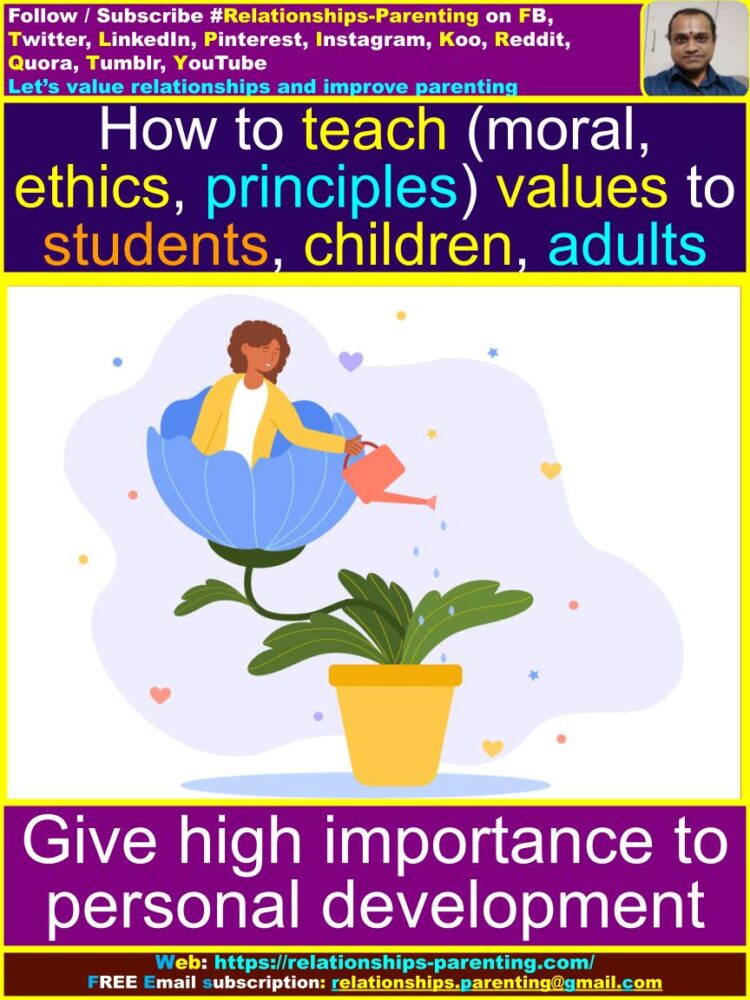
Creativity is the process of development : In the modern days only the creative people have higher chance of success. As children or students or adults, we are always told to be creative to find new ways, overcome obstacles, develop new ideas and execute projects and be better humans.
Creativity is the stepping stone that helps our personal growth. Creativity means that you are able to successfully combine playfulness and discipline, responsibility and restraint.
A light-hearted and fun-loving spirit is characteristic of creative individuals, but it is balanced with unwavering traits of perseverance, endurance and competitive seriousness.
Benefits of being creative: Be a good problem solver | Improved self-expression and awareness | Reduced stress, anxiety and mood disturbance | A sense of extended time |
A sense of freedom | Stress relief | A sense of pride | Being able to create something special for people | Of course we can earn and save lots of money.
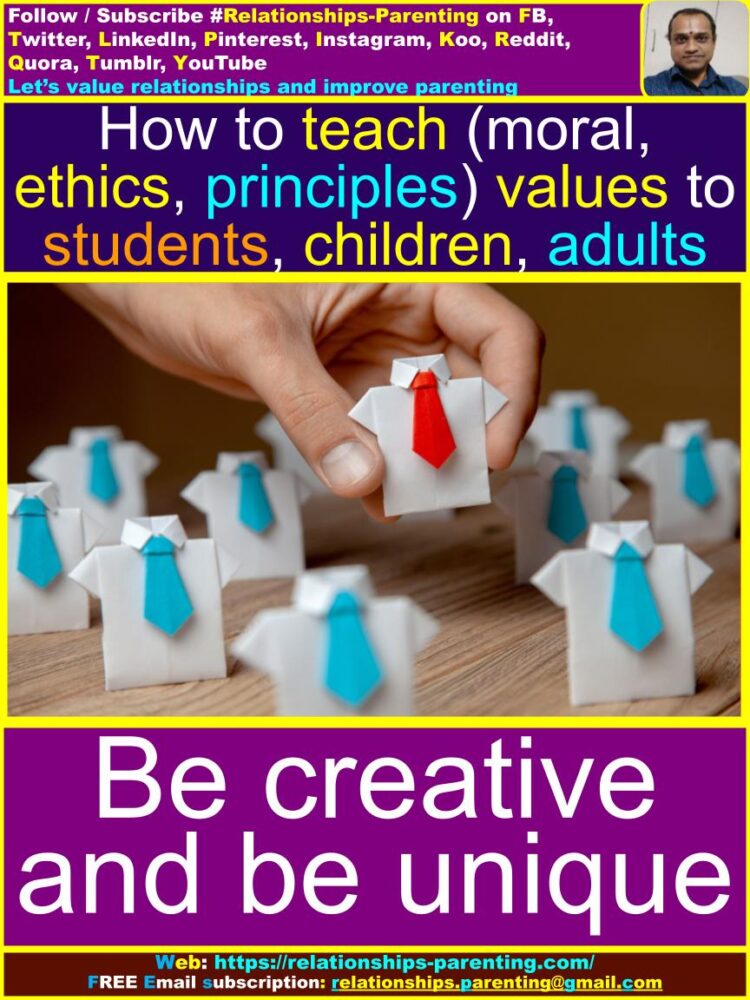
Respect is the foundation of everything : Respect is important to our well-being and success. When we respect others and feel respected in return, it fosters positive relationships and a sense of belonging.
And when we take pleasure in showing others respect, it boosts our self-esteem and motivation to achieve more. Giving respect to others is about the freedom to truly be yourself and love who you are.
In a healthy relationship, respect looks like speaking openly and honestly with each other and listening to each other. And similarly value each other’s feelings and needs.
Respect is the form of satisfaction. On the other hand, if you have always respected someone and you started treating them with care and affection, respect would have come before love.
Either way, you should always show respect to all good people and they will show you respect in return. Respect is the another name of successful relationship.
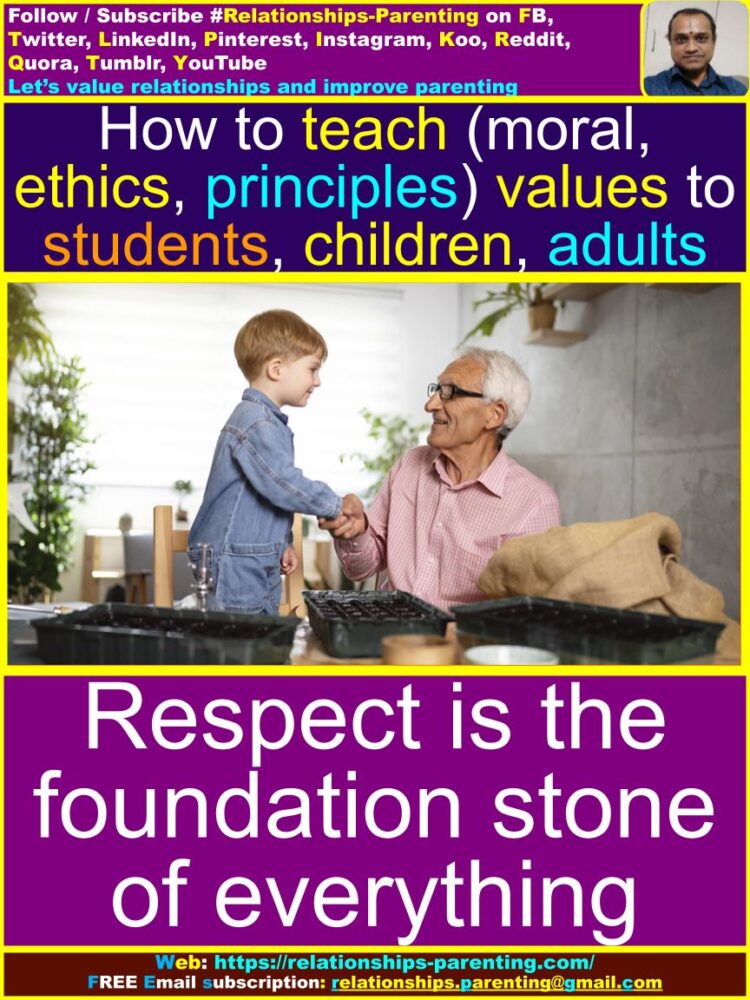
Kindness is the best form of humanity : Acts of courtesy and good deeds can make the world a happier place for all. Kindness can increase feelings of confidence, self-control, happiness and optimism.
Kind people can encourage others to repeat the good deeds they have experienced themselves and thus contributing to a more positive community. Being kind prevents the negative effects that stress can have on us.
Witnessing or participating in acts of kindness and warmth produces oxytocin, the “love hormone.” Oxytocin lowers our blood pressure and improves our overall heart health. It boosts our self-esteem and optimism.
Truly offering kindness shows a level of mental strength and resilience that is grounded in self-acceptance.
This level of acceptance requires a significant amount of inner strength and hard work to achieve. Kindness is an important virtue for sustaining relationships, which helps build a trusting and cooperative society.
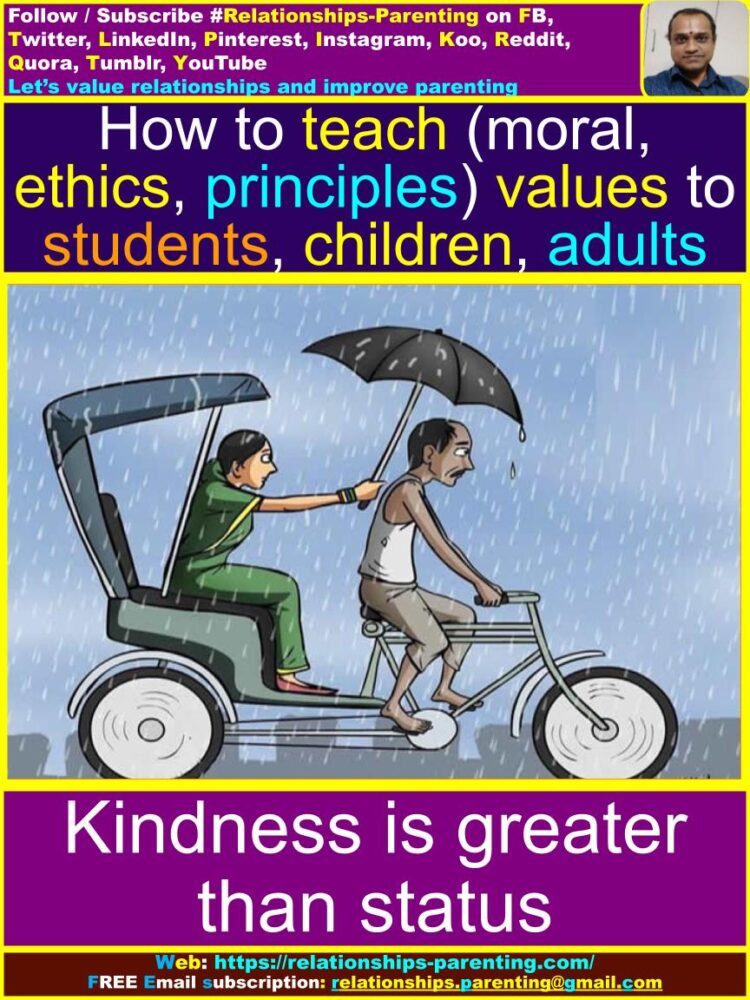
Accountability is the measure of a leadership : Accountability means accepting responsibility for one’s own actions. It indicates a willingness to be transparent, allowing others to observe and evaluate one’s performance.
Accountability allows you to be responsible for your own actions and decisions, and it builds trust with the people around you. Whether you are the president of the country or a security guard, accountability shows that you are responsible for your own efforts or actions.
So, if you’ve made a mistake, don’t hesitate to admit it and accept the consequences. Moreover, when you admit mistakes, you will not be called a weak person, instead you will have the opportunity to find solutions for them.
Benefits of accepting responsibility: Makes you responsible | Promotes ownership | Reduces collisions | Improves performance | Helps measure progress | Inspires self-confidence |
Builds trust | Helps you validate your thoughts and ideas | Supports you in doing new things | Eliminates the things that hold you back | Reduces self-pity | Helps you build connections and relationships.
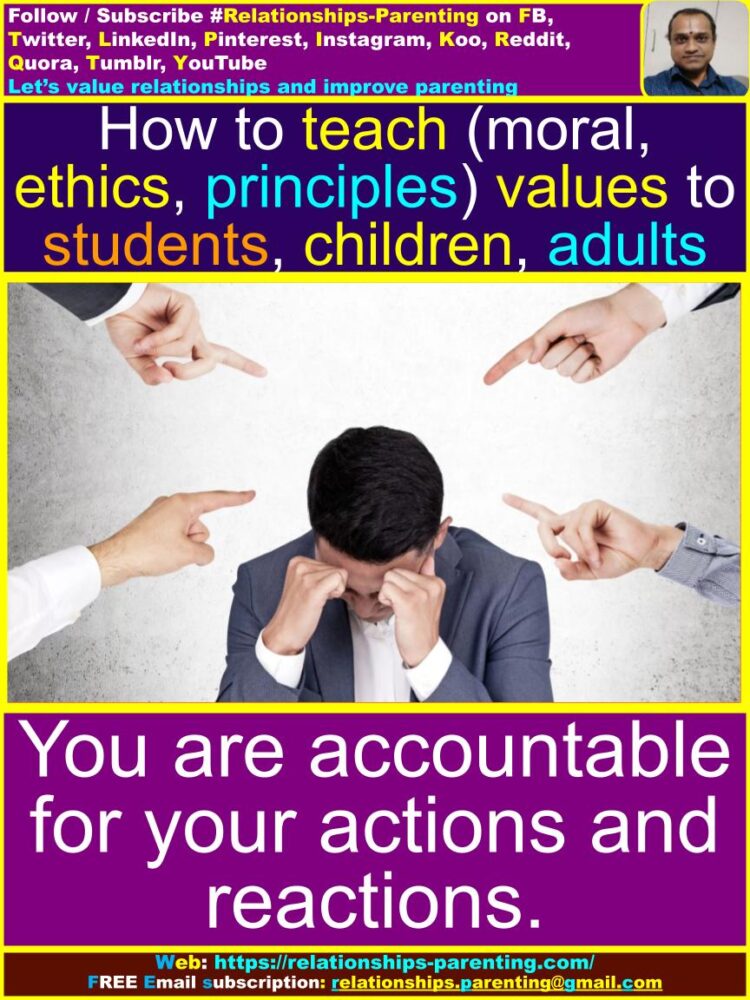
Spirituality is the aspect of being human : Spirituality includes a wide range of beliefs, practices, and experiences around the world related to the nature of our existence and our relationship with the divine.
At its core, the spiritual dimension of human beings is related to the search for meaning and purpose in life in connection with the Almighty. Spirituality involves recognizing a feeling or sense or belief that there is something greater than oneself.
Spirituality shows that we are mere human beings and are satisfied with our sense organs and similarly spirituality demonstrates that we belong to the great cosmic nature or divinity.
Spirituality is all about finding a meaningful connection with something divine and much bigger than yourself, which can produce positive results when we belief in the Almighty 100% and emotions such as love, peace, awe, affection, contentment, gratitude, and acceptance.

Only strong can apologize : Some people think that apologizing is a form of weakness. But, on the other hand, apologizing is a sign of strength. Apologizing requires integrity and great character.
When you have done a mistake, your willingness to admit your mistake in the interest of self-improvement is actually a major strength. (It doesn’t mean you can keep on doing mistake and ask for apology – This is the form of weakness.)
Positive apology plays an important role in your personal and professional success. If knowing you’ve upset someone else is stressing you out, apologizing can relieve any negative feelings.
Apologizing can help you feel more confident that you can continue with your school life or workplace relationship, especially if your friend or colleague or manager accepts your sincere apology.
Apologizing has many positive effects on our mental health, including reducing feelings of guilt and regret. When we apologize, we address the source of our negative feelings and work toward a solution. It improves self-esteem, reduces anxiety and improves overall mental health.
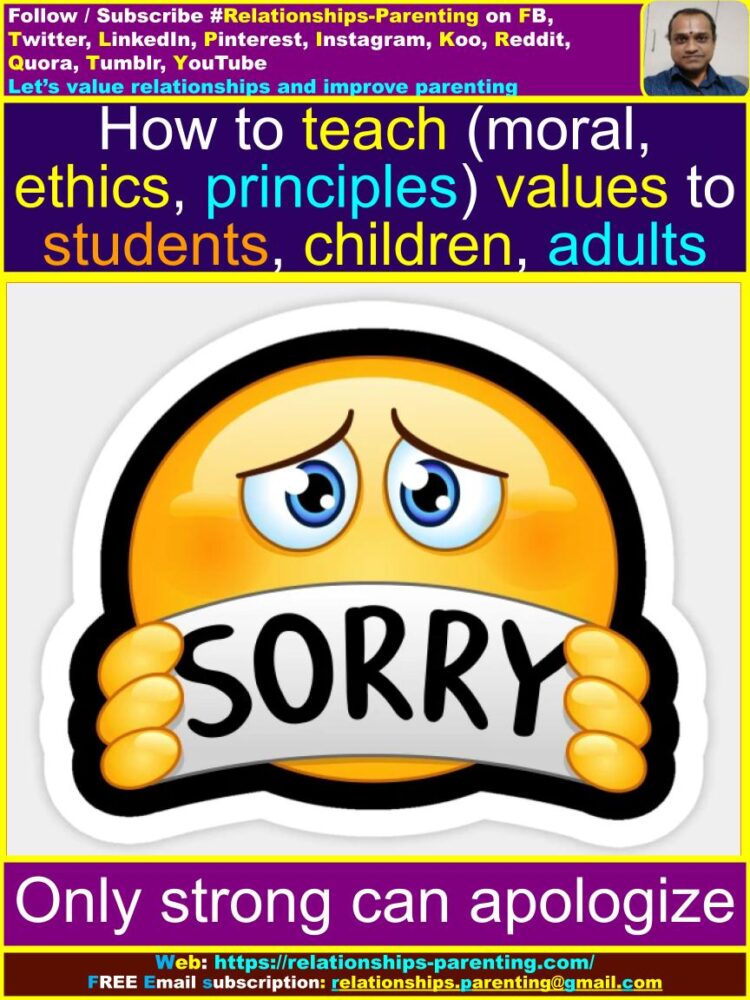
Determination is the mother of perseverance : Determination is a positive emotional feeling that involves persevering toward a difficult goal despite of various obstacles. Determination occurs before a goal is achieved and motivates behavior that helps achieve one’s goal.
Determination with the combination of discipline and efforts is about how much you want something and how much time you are willing to go to make it happen.
Perseverance, on the other hand, is your ability to keep trying your best despite difficulty and delay in achieving success. Determined and disciplined people have no self-defeating concepts such as can’t, won’t, fail or give up.
Their attitude is that they are willing to do anything to achieve their goal. For them, it doesn’t matter how long it takes or how many obstacles have to be overcome. They have a burning desire to succeed.
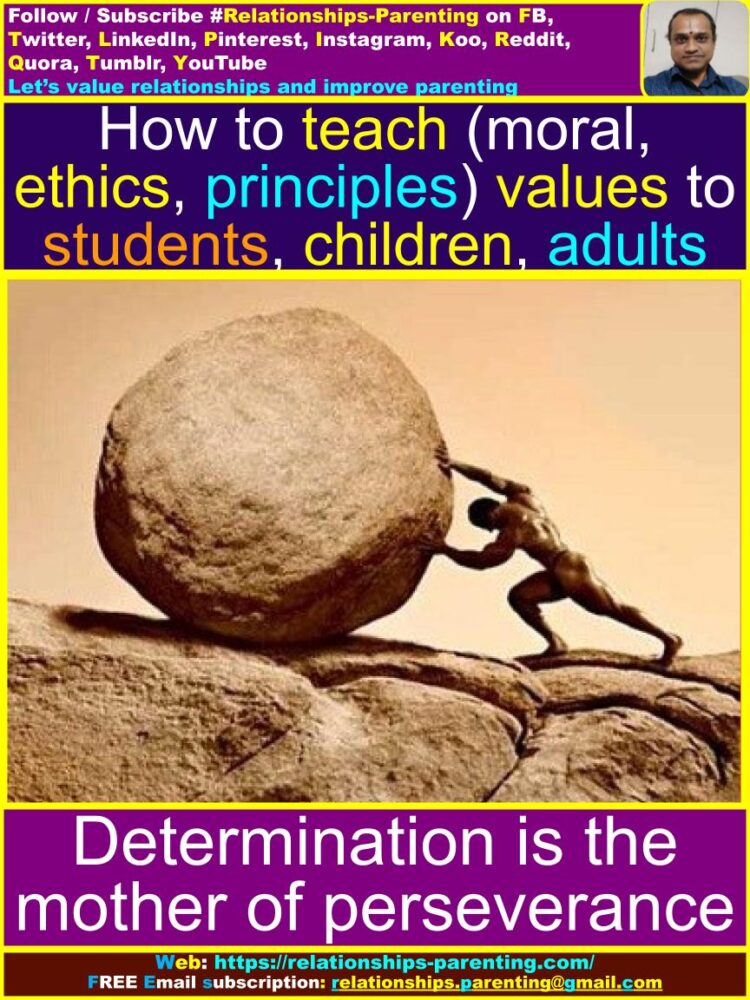
Humility is the quality of being humble : Humility or modesty or generosity is a great virtue but often misunderstood and mistaken for a weakness. Humility enhances many positive qualities. It brings out qualities like reliability, generosity and humility.
Humility makes you kind and compassionate and helps improve your social status. Humility is actually your asset. It allows leaders to listen to others, learn from their mistakes, and develop empathy for their team members.
As a result, humility fosters an environment of trust and respect, two essential elements for any successful team. Humility helps us extend more compassion and empathy towards others.
Those who practice humility are more likely to consider the beliefs and opinions of others. This is largely because humility allows one to be less self-involved and more attuned to the feelings of others. Humility is a virtue highly valued by all positive people.
This is what we want to see in our leaders and politicians and expect from those who lead us. This means that humility is one of the most important qualities for an effective leader to possess.

Wise-ness should be your top quality : If you spend more time introspecting than judging others, you are on your way to becoming a wiser person.
Many philosophers, statesmen and great thinkers firmly believed that wise people act virtuously, make decisions and even advise the most intelligent people. Wise people do not hold grudges.
They accept their own mistakes without any shame and acknowledge the imperfections and failures of others. Wise people look for the good in everyone, even those they disagree with, focusing on understanding and compassion rather than judgment.
The wise seek to lift others up. Wise people always try to understand themselves first. They look inside to know why they feel, think and do what they do.
So they know what their strengths and weaknesses are. A wise person is able to use their experience and knowledge to make sensible decisions and judgments.
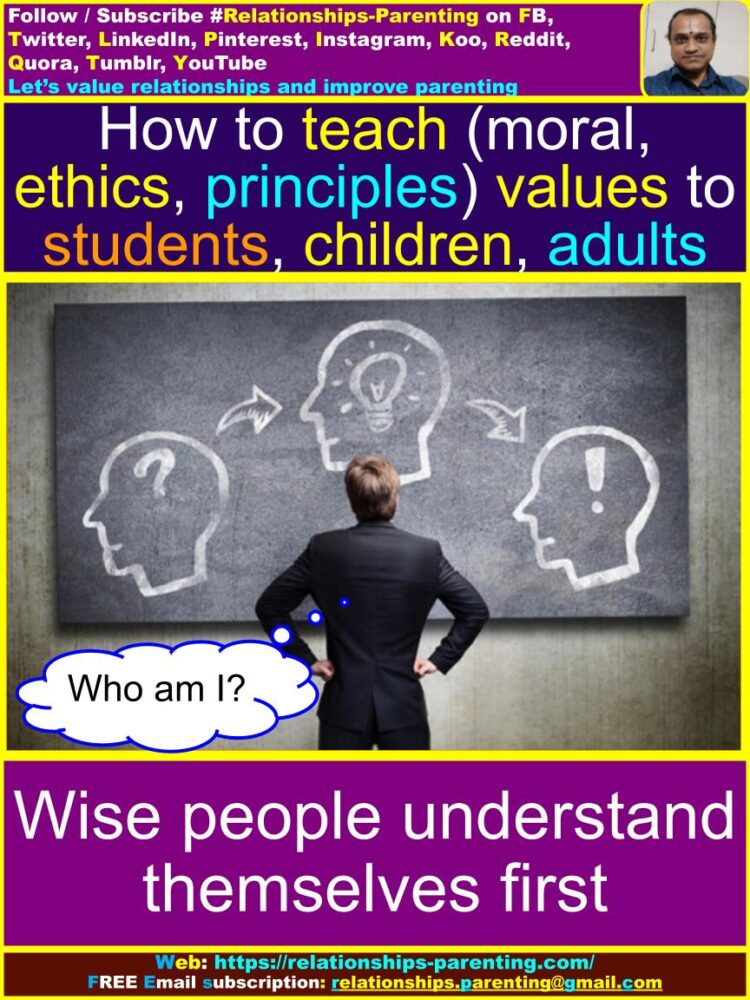
Gratitude is the foundation of happiness : Feeling and expressing gratitude makes us feel good about ourselves. It offsets our brain’s tendency to focus on threats and negative aspects of life, creating positive emotions like happiness and love.
Always be grateful and love for what you have. In positive psychology, gratitude is strongly and consistently associated with greater happiness.
Gratitude helps people feel more positive emotions, have better experiences, improve their health, deal with adversity, and build stronger relationships. People feel and express gratitude in many ways.
Expressing gratitude spreads positive waves. When you feel good about something and your appreciation makes someone else feel good, it contributes to an emotional economy, a give and take of emotions that fosters the positive ethos of the entire group.
Being grateful can also support greater health, happiness, and wisdom in ourselves and our surroundings.

Stability is another name of strength : Living and spending time in a loving, safe and stable environment is incredibly important to all of us. We all want to feel that we belong, that we are loved and cared for, and this is especially important for children and young people.
Whether personal, financial, relational or physical, stability provides a sense of peace, security and control. The basic definition of the word stability is “steady, firm, solid, stable and secure”.
Anything that is unstable is considered weak, uncertain or wandering. Having a stable life means planning for the future and having backup plans in case things go wrong.
Stability means keeping the end goal in mind and making sacrifices and striving on a daily or consistent basis as a means to achieve the end goal.
Mental stability and happiness are highly correlated. It is impossible to have one without the other, and it is difficult to achieve both when you are facing some kind of adversity in life.
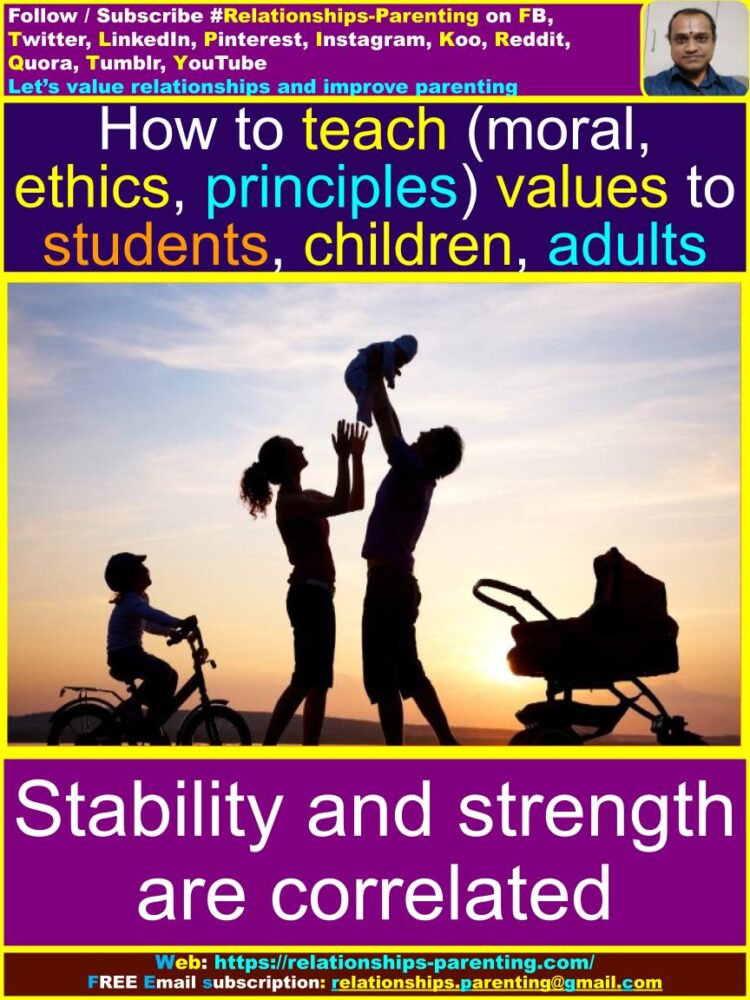
More information will be added to this on regular basis. Please visit this post and blog / website to know more about relationship and parenting.
Continue reading about:
To know more about “Husband and wife information, facts“, please click the below link:
Husband and wife information, facts
Dear friends, if you need any clarifications about this post, kindly let me know, I will definitely try to answer all of them.
Also add your COMMENT below, SHARE on different SOCIAL MEDIA networks.
This will help to know the quality of this content and also it will be helpful to know if any improvements is required for the content.
If you feel this content is useful to you and has helped you to improve your knowledge, kindly share this with your well-wishers.
Because “SHARING MEANS CARING”.
To receive FREE EMAIL SUBSCRIPTION about #Relationship #Parenting, you can send an email to [email protected] from your email ID.
Let you and your well-wishers live a prosperous, healthy and fearless life through out your life term.